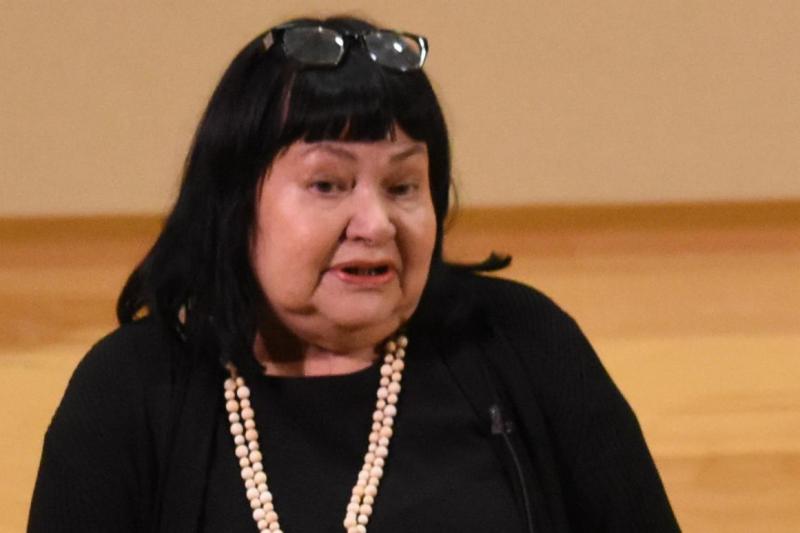
“It’s a very good production,” she said in a question and answer session on stage with the cast after the play. Sanchez-Scott said she has seen her signature work performed dozens of times, but enjoys student productions the most. “Each time the actors bring whatever they have and make it their own. It’s unique and it’s great — they’re all just going for it,” she said.
The play uses the Latino literary technique of magical realism. It explores machismo, violence and gender roles in a Latino family strained by the father’s violent temper and its consequences. He is obsessed with breeding champion roosters, portrayed by stooped dancers in feathered costumes, and determined his children will never work in the fields.
Director Cynthia DeCure, assistant professor of theater, put her own stamp on the production and set it in the Central Valley. “Everything was purposeful,” she said. One scene adds insight into a character who drunkenly cha-chas as the radio blares. The music DeCure chose is a recording by her father, Grammy-winning musician Ray Santos.
Guest artist Luis Maya plays Gallo, the macho dad arriving home from a years-long stay in jail. The anger required for the role was challenging for a guy who normally keeps his cool, Maya told the crowd. Gallo’s long-suffering wife Juana hangs in the shadows, fretting about being too plain, a challenge for the typically outspoken theatre major Maribel Torres, who plays her.
Both author and director said they identified with Gallo’s daughter Angela, played by Brenda Pedraza, a social sciences major. Childlike and religious, but with flashes of humor and directness, Angela serves as a truth-teller through the story.
The inspiration for the play was a picture of a handsome man and adoring woman walking in a canyon, Sanchez-Scott said. Imagining what might be their story wove into themes of gender roles, she said, “Women in the Latin culture give so much of their lives to the family.”
The playwright spoke of themes of the play, and her own story, at an earlier session — part of the Stan State Social Justice in the Central Valley conference. Daughter of an Indonesian mother and a Colombian agronomist, Sanchez-Scott grew up in Columbia and at a Catholic boarding school in England, settling in San Diego as a young teen.
Some well-intentioned mischief led to a stint for the young Sanchez-Scott working in her father’s fields of experimental green beans. “That’s how I learned a lot about people in the fields,” she said. “Even though it’s stoop labor, back-breaking work, they just had a sense of putting up with it and having fun. I thought that was so remarkable. And yet, they were paid such a low wage to work so hard,” she said, wondering aloud if political leaders understand, “Not a lot of people are lining up for that work. They’re not taking jobs from anybody.”
As a playwright, she said, “You have to write about things that are happening in the world, and write about people and a sense of, ‘who are we?’ and ‘where are we going?’ And it’s scary right now.” She keeps a basket of rolled up socks by her chair to throw at the TV as she watches the news, but when she writes she likes quiet, even writing by flashlight under the covers to minimize distractions.
“My play is about people that work in the fields, and what it does to young people working in the fields,” she said, referring to the prejudice she experienced as a young woman with dark skin, dark hair and a foreign accent. “In the beginning, if you’re a teenager, you start to think something’s wrong with you, and you start to think of yourself as inferior, and you start to be ashamed of who you are and where you come from. I think that’s so damaging to kids, really damaging.”
Performances of “Roosters” continue with evening performances Nov. 15-18 and a matinee on Nov. 19.